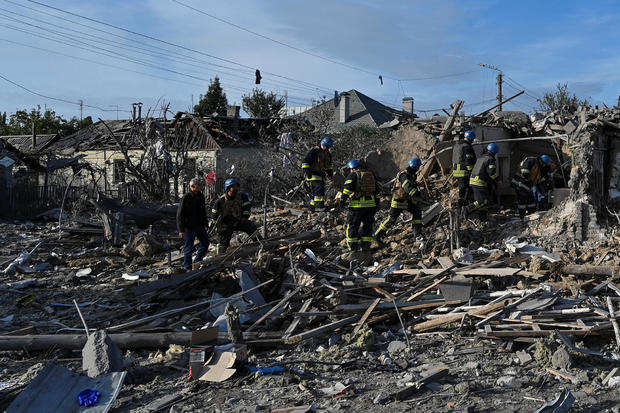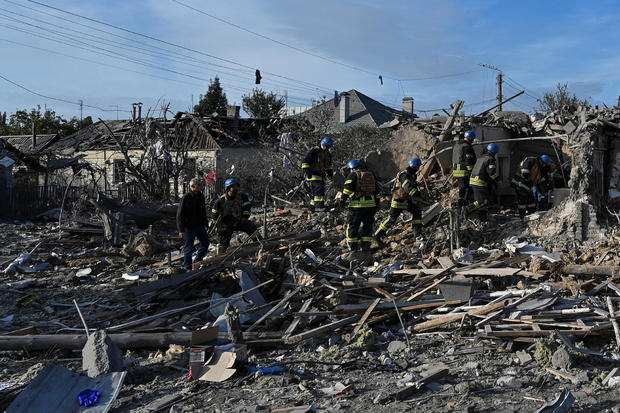A Russian barrage pounded apartment buildings and other targets in the Ukrainian city of Zaporizhzhia, killing at least 17 people and wounding dozens, officials said Sunday.
The blasts in the city, which remains under Ukrainian control but sits in a region Moscow has claimed as its own, blew out windows in adjacent buildings and left at least one high-rise apartment building partially collapsed.
The multiple strikes came after an explosion Saturday caused the partial collapse of a bridge linking the Crimean Peninsula with Russia. The Kerch Bridge attack damaged an important supply route for the Kremlin’s faltering war effort in southern Ukraine, an artery that also is a towering symbol of Russia’s power in the region.
The bombing came a day after Russian President Vladimir Putin turned 70, dealing him a humiliating blow that one military analyst called it a punch in the face for Putin on his birthday, CBS News’ Charlie D’Agata reports.
The rockets that pounded Zaporizhzhia overnight damaged at least 20 private homes and 50 apartment buildings, city council Secretary Anatoliy Kurtev said. At least 40 people were hospitalized, Kurtev said on Telegram.
The Ukrainian military confirmed the attack, saying there were dozens of casualties.

STRINGER / REUTERS
Residents gathered behind police tape by a building where several floors collapsed from the blast, leaving a smoldering chasm at least 40-feet wide where apartments once stood.
Tetyana Lazun’ko, 73, and her husband, Oleksii, took shelter in the hallway of their top floor apartment after hearing sirens, warning of an attack. They were spared the worst of the blast that left them in fear and disbelief.
“There was an explosion. Everything was shaking,” Lazun’ko said. “Everything was flying and I was screaming.”
Shards of glass, entire window and door frames and other debris covered the exterior floors of the apartment where they’d lived since 1974. Lazun’ko wept inconsolably, wondering why their home in an area with no military infrastructure in sight was targeted.
“Why are they bombing us. Why?” she said.
Oleksii, who sat quietly, leaning on a wooden cane, has suffered three strokes, Lazun’ko said. Breaking his silence, he said slowly, “This is international terrorism. You can’t be saved from it.”
In recent weeks, Russia has repeatedly struck Zaporizhzhia, which is the capital of a region of the same name that Russian President Vladimir Putin annexed in violation of international law last week. At least 19 people died in Russian missile strikes on apartment buildings in the city on Thursday.
“Again, Zaporizhzhia. Again, merciless attacks on civilians, targeting residential buildings, in the middle of the night,” Ukrainian President Volodymyr Zelenskyy wrote in a Telegram post.
“Absolute meanness. Absolute evil. … From the one who gave this order, to everyone who carried out this order: they will answer. They must. Before the law and the people,” he added
While Russia targeted Zaporizhzhia before Saturday’s explosion on the Crimea bridge, the attack was a significant blow to Russia, which annexed the Crimean Peninsula from Ukraine in 2014. No one has claimed responsibility for damaging the bridge.
Putin signed a decree late Saturday tightening security for the bridge and for energy infrastructure between Crimea and Russia, and put Russia’s federal security service, the FSB, in charge of the effort.
Some Russian lawmakers called for Putin to declare a “counterterrorism operation,” rather than the term “special military operation” that has downplayed the scope of fighting to ordinary Russians.
Hours after the explosion, Russia’s Defense Ministry announced that the air force chief, Gen. Sergei Surovikin, would now command all Russian troops in Ukraine. Surovikin, who this summer was placed in charge of troops in southern Ukraine, had led Russian forces in Syria and was accused of overseeing a bombardment that destroyed much of Aleppo.
The 19-kilometer (12-mile) Kerch Bridge, on a strait between the Black Sea and the Sea of Azov, is a symbol of Moscow’s claims on Crimea and an essential link to the peninsula, which Russia annexed from Ukraine in 2014.
The $3.6 billion bridge, the longest in Europe, is vital to sustaining Russia’s military operations in southern Ukraine. Putin himself presided over the bridge’s opening in May 2018.
Ukrainian President Volodymyr Zelenskyy, in a video address, indirectly acknowledged the bridge attack but did not address its cause.
“Today was not a bad day and mostly sunny on our state’s territory,” he said. “Unfortunately, it was cloudy in Crimea. Although it was also warm.”
Zelenskyy said Ukraine wants a future “without occupiers. Throughout our territory, in particular in Crimea.”
Zelenskyy also said Ukrainian forces advanced or held the line in the east and south, but acknowledged “very, very difficult, very tough fighting” around the city of Bakhmut in the eastern Donetsk region, where Russian forces have claimed recent gains.
Train and automobile traffic over the bridge was temporarily suspended. Automobile traffic resumed Saturday afternoon on one of the two links that remained intact, with the flow alternating in each direction, said Crimea’s Russia-backed leader, Sergey Aksyonov.
The Russian transport ministry said on Telegram Sunday that passenger train traffic between Crimea and the Russian mainland resumed overnight “according to schedule.”
In a separate Telegram post Sunday, the ministry said car ferries also were working between Crimea and the mainland, with the first crossing taking place shortly before 2 a.m. local time (11 p.m. GMT).
While Russia seized areas north of Crimea early in its invasion of Ukraine and built a land corridor to it along the Sea of Azov, Ukraine is pressing a counteroffensive to reclaim that territory as well as four regions Putin illegally annexed this month.
Russia has ramped up its strikes on the city of Zaporizhzhia since formally absorbing the surrounding region on September 29.
The regional governor of Zaporizhzhia reported that the death toll had risen to 32 after Russia’s missile strike on a civilian convoy making its way out of the city on September 30. In a Telegram post, Oleksandr Starukh that one more person died in the hospital on Friday.
A part of the Zaporizhzhia region currently under Russian control is home to Europe’s largest nuclear power station. Fighting has repeatedly imperiled the the Zaporizhzhia Nuclear Power Plant, and Ukrainian authorities shut down its last operating reactor last month to prevent a radiation disaster.
The International Atomic Energy Agency, the U.N.’s nuclear watchdog, said Saturday that the Zaporizhzhia plant has since lost its last remaining external power source as a result of renewed shelling and is now relying on emergency diesel generators.
The Crimean Peninsula is a popular destination for Russian tourists and home to a Russian naval base. A Russian tourist association estimated that 50,000 tourists were in Crimea on Saturday.
- In:
- Ukraine
- Russia
